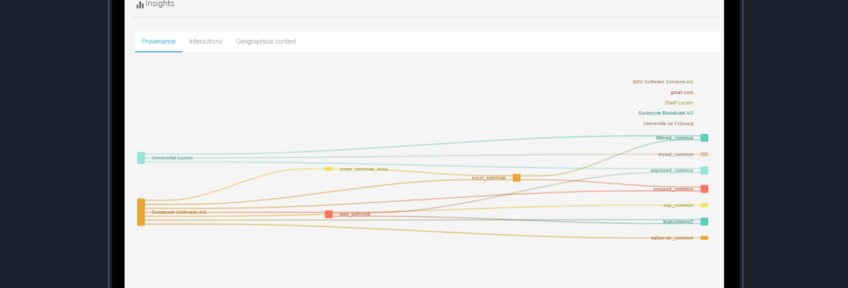The Government of the city of Lucerne is piloting a new "digital cooperative" model, which allows public sector, private sector and citizens to contribute with data and get remunerated (financially or otherwise). Through this digital coopoerative, the population is able to tackle important and/or urgent issues that affect all its residents using data-driven decisions. For the initial stage, the data and issue tackled is related to mobility.
Innovation Summary
Innovation Overview
The project is intended to deliver the following outcome: A practical concept of digital cooperative, intended to be a future approach for handling data that can be used across all relevant/suitable business models.
It is envisioned to use such collaborative data in the city of Lucerne to create a digital twin for traffic flows.
Contributions to the city of Lucerne:
- Better understanding of the mobility behavior for the Optimization of parking and charging options to promote e-mobility / green mobility.
- Reduction of traffic jam hours and support of data-supported public transport planning and Development. The city of Lucerne has been struggling with significant traffic volumes for years, around 2.5 m CHF go into a program to reduce traffic jams and improve steering of traffic flow.
- Better understanding of non-motorised traffic, in particular pedestrians and cyclists.
A smarter, cheaper alternative to physical sensors: Installing traffic sensors in the city could help here, but would be high expensive (sensors for cars, bicycles, pedestrians, those for the capacity utilization of buses, trains, trams, etc. is an enormous effort). A more elegant way is to ask citizens to contribute through their smartphones "Human Sensors" for the betterment of their city.
Additionally a technical solution that avoids centralizing data and unwanted disclosure of data is needed. Finally a more efficient, flexible way to setup data-sharing agreements is also necessary.
Innovation Description
What Makes Your Project Innovative?
It's the fist time we involve completely different parties, like citizens with low digital literacy and big corporates like telco, and public bodies like city governments and we will identify how to engage them to interact together, and we also the new concepts called dataspaces.
What is the current status of your innovation?
The are 2 streams:
- The Technology stream has a fully-working SaaS solution provided by Swisscom that combines legal and technical aspects of data-sharing for the enterprise.
- The Research stream is currently interviewing potential data-producers and data-consumers in the city to identify a pull or push strategy that is beneficial for all actors.
Innovation Development
Collaborations & Partnerships
The digitial cooperative is designed with the support & feedback from:
- Local authorities (City of Lucerne) to facilitate the discussion and collaboration,
- Academia (University of Luzern, University of Fribourg) to bring prior-art and engage with the citizens from a neutral perspective
- Private sector
- Swisscom: To develop the decentralized data infrastructure and automation of legal contracts
- Beyond Civic: To support with the innovation know-how applicable for smart cities
Users, Stakeholders & Beneficiaries
- Beneficiaries: citizens, commuters, visitors
- Users: transport business, planning offices,
- Stakeholders: city, planning offices, citizens, state governments, national governments, tour-operators
Innovation Reflections
Results, Outcomes & Impacts
With regards to the technology developed, we have shown the demo to more than 100 corporates and startups worldwide and we have received an overwhelming positive feedback. With regards to the social science research we are currently deploying multiple surveys, one-on-ones, workshops and work is currently in progress.
Challenges and Failures
- To find a sustainable business model, particularly to make it attractive for public bodies to adapt an insights-as-a-service for actionable decision-making
specially as a support for census-derived project execution. - Identify the governance that explains how precise data/measurement are, and also representativeness of the data subjects/objects.
Conditions for Success
- Finding product-market-fit for the technological solution that can be applied in multiple digital cooperatives in different industries.
- Engaging the private sector to participate in a quid-pro-quo for the betterment of the local region.
- Convincing citizens to share some of their personal data and to convince them there are benefits to providing such data.
Replication
If it works in CH, it may work in similar cities, particularly on smart cities moving towards the 3rd generation smart cities (technology-driven, technology-enabled and city-led, citizen co-creation).
Lessons Learned
- Designing technology hand in hand with the stakeholders in mind has been of immeasurable value.
- It's very difficult to create ecosystems because it must be use-case oriented, and the use-case must equally impact every member of the ecosystem.
Anything Else?
We would be happy to show demos of the software and intermediate results of our findings.
Project Pitch
Supporting Videos
Status:
- Developing Proposals - turning ideas into business cases that can be assessed and acted on
- Implementation - making the innovation happen
Files:
- data_sharing_infograph Infograph provided by TrustRelay
Date Published:
18 January 2023


